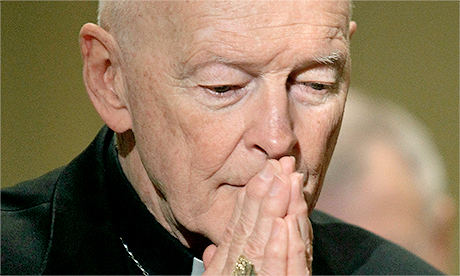The Catholic Church cannot pretend to be shocked about the pattern of sexual abuse of adult seminarians by Cardinal McCarrick, recently detailed in a comprehensive story in The New York Times.
As The Times made clear in its reporting, many church leaders had received multiple notices of the cardinal’s behavior.
Local dioceses had been told, the papal nuncio in Washington, D.C., had been told and, eventually, even Pope Benedict XVI had been told.
But none of these reports interrupted Cardinal McCarrick’s rise through the ranks nor his appointment as cardinal nor his eventual retirement in 2006 as a respected leader of the U.S. church.
Nor did these reports lead to his removal last month from public ministry, which finally resulted from a credible allegation of abuse of a minor almost 50 years ago, recently revealed and acted on by the Archdiocese of New York.
It is true that none of the earlier reports of abuse alleged criminal behavior with minors, but they were serious enough that Cardinal McCarrick should have been called to account for the terrible misuse of his office and authority.
The church and its leaders should be ashamed of their failure to do so.
The slow and halting progress the church has made by way of reforms adopted in response to the sexual abuse of children, for example through the Dallas charter, has been called into question by the revelation of its ongoing failures to deal with other reports of abuse.
Nor should the media, including we in Catholic media (Cardinal McCarrick was a longtime friend of this magazine and delivered the homily at our centennial celebration in 2009), be absolved of responsibility for any failure to take these and other rumors and reports as seriously as was required.
To demand accountability only of the hierarchy is itself hypocrisy.
The church also cannot pretend that this is an isolated incident.
There are very likely similar reports involving other bishops and church leaders who have abused their authority or committed sexual offenses that have been ignored over past decades.
As societies around the world reckon with the unfolding of the #MeToo movement and victims of sexual abuse and harassment find their voices, the church must not pretend that this is merely a regrettable episode that will soon be over.
In all likelihood, there are more reports still to come that will show this situation is worse than is now known.
The church should remember that real improvement consists not in the cessation of bad press for the church but in the development of a culture in which powerful leaders do not expect their misdeeds to be silently covered up and in which victims of abuse and harassment feel supported in their decisions to confront those who have mistreated them. Continue reading
Additional readingNews category: Analysis and Comment.




